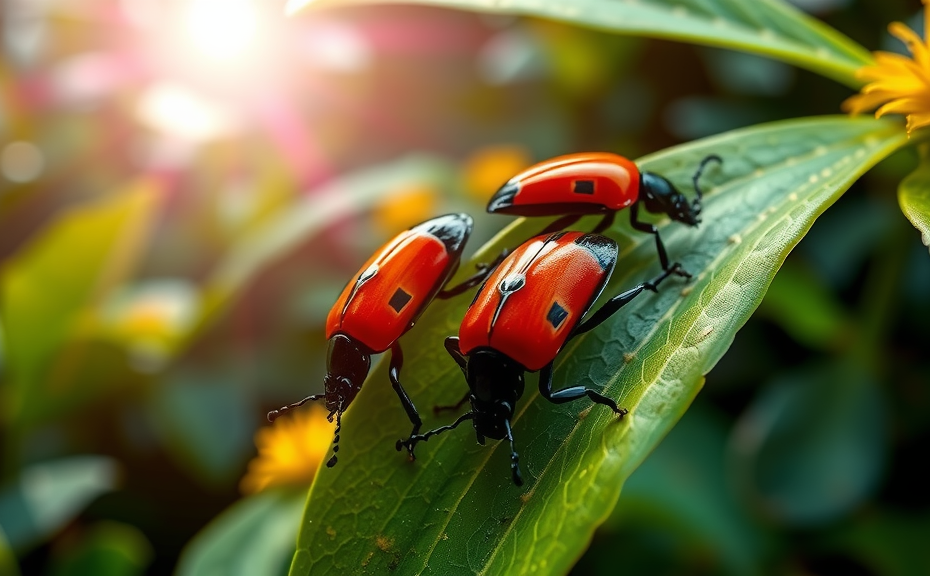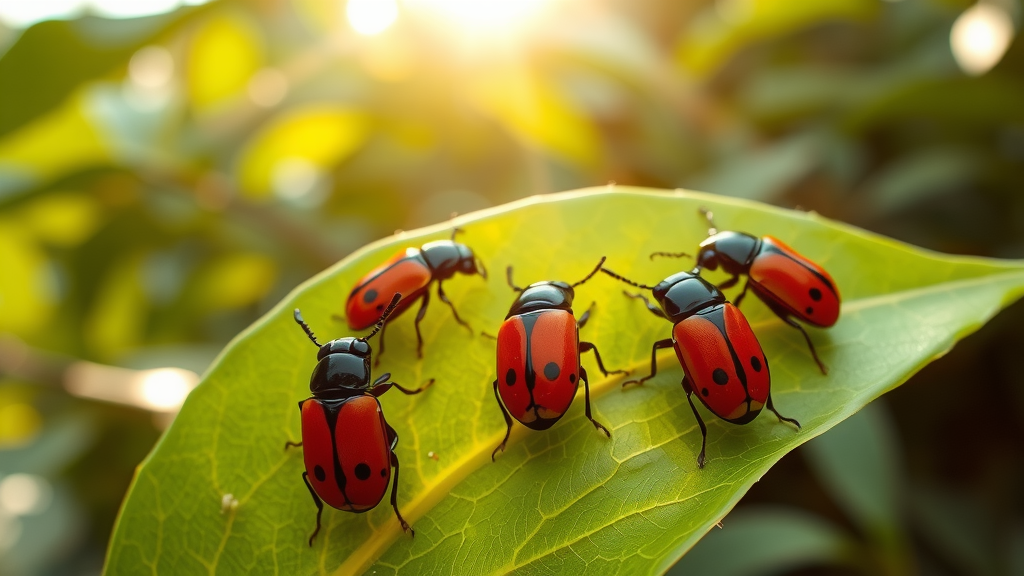Have you ever stopped to marvel at the tiny creatures you might spot in your garden? With over 4,000 species of these insects thriving in the UK, they are more than just a pretty sight; they play an important role in our ecosystems. While many folks hold onto misconceptions, believing these little pests pose some sort of danger, that couldn’t be further from the truth.
For example, not all of these species bite, despite what you may have heard.
Most beetles are harmless and can even help agriculture by keeping other pest populations in check. So, let’s dig deeper into these myths and uncover the reality about these remarkable insects, some of which, despite being labeled as pests, play vital roles in agriculture and our gardens by supporting various species and ecosystems.
Are Beetles Dangerous To Humans
Many people have questions about the safety of these intriguing insects when they encounter them. Most beetles aren’t harmful and play a significant role in our ecosystems, aiding with decomposition and pest control.
It’s quite uncommon to experience a beetle bite, and if it does happen, the effects are usually mild.
Even well-known species, like ladybirds or stag beetles, don’t bring significant health risks.
That said, some individuals might react to specific bites, leading to swelling or discomfort. If you notice any unusual symptoms, seeking medical advice is wise.
These little creatures are often more beneficial than harmful, serving as helpful wildlife rather than threats.
Understanding Beetle Species In The UK
If you take a moment to look closely, you’ll discover a fascinating world of insects right in your backyard. With over 4,000 unique species buzzing around, these critters are a significant part of the UK’s biodiversity.
Some, like the charming Ladybird, lend a hand in natural pest control by munching on aphids and other garden nuisances.
Each beetle exhibits different behaviors—while some are active at night, others thrive during the day, making them a delight to observe in various habitats like woodlands, fields, and wetlands.
It’s also worth noting the larvae stage, which plays an important role in breaking down organic material, further enriching the ecosystem. So, the next time you spot one of these little wonders, take a closer look; they’re much more than just bugs, as their larvae play vital roles in ecosystems, their behavior can inform pest control strategies, and their diverse habitats contribute to our understanding of entomology and biodiversity.
Insects in the UK
- There are over 4,000 unique insect species in the UK, contributing significantly to biodiversity.
- Ladybirds help control pests by feeding on aphids and other garden pests.
- Insects exhibit diverse behaviors, with some being nocturnal and others diurnal, enhancing ecological observation opportunities.
- The larvae stage of insects is crucial for breaking down organic material, enriching the ecosystem.
Common Pests And Their Impact
When it comes to our gardens and landscapes, the creatures we often overlook can have significant roles. For instance, beetles play a dual part as natural predators, helping to keep certain pest populations in check.
Yet, it’s important to note that not all beetles are benign; some can wreak havoc on crops and gardens, leading to shifts in local biodiversity.
Managing these impacts might sometimes call for conservation efforts to protect the ecosystem.
Identifying these beetles is key to controlling their presence effectively. They contribute to decomposition, but monitoring their population is essential for fostering a thriving environment for all species.
Do beetles pose a risk to our well-being? Let’s dive into their natural predators, the strategies for conservation, the methods of eradication, and the importance of proper identification and treatment within our environment.
Do Beetles Bite Or Sting
Many people have questions about whether these bugs can pose a threat. Most beetles found across the UK tend to be rather shy, preferring to hide away than confront a human.
They aren’t aggressive by nature, which means they will often choose to flee rather than bite when feeling threatened.
There are exceptions, like click beetles and ground beetles, which can deliver a bite if they feel cornered.
These bites might catch you off guard but typically aren’t serious.
Having some awareness of these insects can help with prevention and minimize any unwanted encounters in your space.
When it comes to stinging, the vast majority of beetles lack that ability. Still, certain species can deliver a bite that stings a bit, although awareness of their ecological impact and the importance of prevention can minimize encounters with household pests, reducing the need for insecticides.
The Role Of Beetles In Ecosystems
These fascinating little creatures do far more than simply scuttle about; they are integral to the health of the environment. As proficient decomposers, they break down organic matter like fallen leaves and dead plants, playing a crucial role in recycling nutrients back into the soil.
This process helps to maintain the natural balance, allowing various species to flourish and thrive within their habitats.
Some beetles also contribute significantly as pollinators, aiding plants in their life cycle and promoting reproduction.
They don’t just benefit plants; these insects are a key food source for numerous animals, supporting a diverse web of life. Learning about their feeding habits can deepen our appreciation for what they bring to the ecosystem, as they play a crucial role in natural balance, affect life cycles, and influence the spread of repellents, allergies, and diseases!.
How To Manage Beetle Infestations
Dealing with these pesky little creatures can be quite the hassle, but you have options to regain control without too much stress. Start by identifying the species, as knowing their reproductive habits can guide you in creating an effective strategy.
Take the time to assess how widespread the issue is so you can pinpoint the right areas to target.
Using organic methods, like diatomaceous earth, is a great way to keep those critters at bay without resorting to harsh chemicals.
Regular cleaning is a must; it helps eliminate their hiding spots and food sources, making it harder for them to set up shop. Staying proactive means monitoring your space regularly and adjusting your approach based on what you find. your garden’s biodiversity by employing organic methods that support beneficial insects while being mindful of the mating and reproduction patterns of indigenous species, as highlighted by recent research.
| Method | Description |
|---|---|
| Identify Species | Understanding the species helps tailor control strategies based on their reproductive habits. |
| Organic Control | Using diatomaceous earth is an effective way to deter pests without harmful chemicals. |
| Regular Cleaning | Consistent cleaning reduces hiding spots and food sources for pests. |
| Proactive Monitoring | Regularly check your space to adjust control methods based on pest activity. |
Safety Precautions Against Beetles
Taking a few safety steps can make a big difference when it comes to handling those pesky beetles.
Wearing protective gear is a simple way to shield yourself, so consider donning gloves to prevent any skin irritations, and grabbing a mask can help with dust or allergens.
When it’s time to remove beetles, using a jar or container to trap them is a smarter move than getting too close.
There are some amusing myths floating around about these insects that often lead to unnecessary panic.
Community education about proper pest management can truly enhance our approach to dealing with these tiny critters.
Transitioning from safety practices to debunking myths can help everyone feel more at ease with their presence
Myths About Beetles And Harm
It’s common to feel a bit uneasy when you spot one of those tiny creatures scuttling around. Many misconceptions exist about their role in our environment.
Most species are completely harmless and actually contribute positively to soil health and vibrant gardens.
They help manage pest populations, keeping things in check naturally.
If we take a closer look at these fascinating insects, we can improve our risk assessment and alleviate unnecessary worries. While a few might bite, the vast majority are simply minding their own business.
So, the next time you encounter one, consider the positive impact it has on population dynamics and how it helps maintain balance in the ecosystem. Let’s shift our perspective and embrace these little helpers instead of fearing them, as they can play a crucial role in risk assessment, contribute to the understanding of population dynamics, and enhance soil health when managed through responsible gardening in the context of environmental factors.
Beneficial Insects
- Many insect species play a vital role in enhancing soil health by aerating the soil and contributing to nutrient cycling.
- Beneficial insects help control pest populations naturally, reducing the need for chemical pesticides.
- Most insects are harmless to humans and contribute to the balance of ecosystems by supporting biodiversity.
- Responsible gardening practices can enhance the positive impacts of these insects on gardens and the environment.

